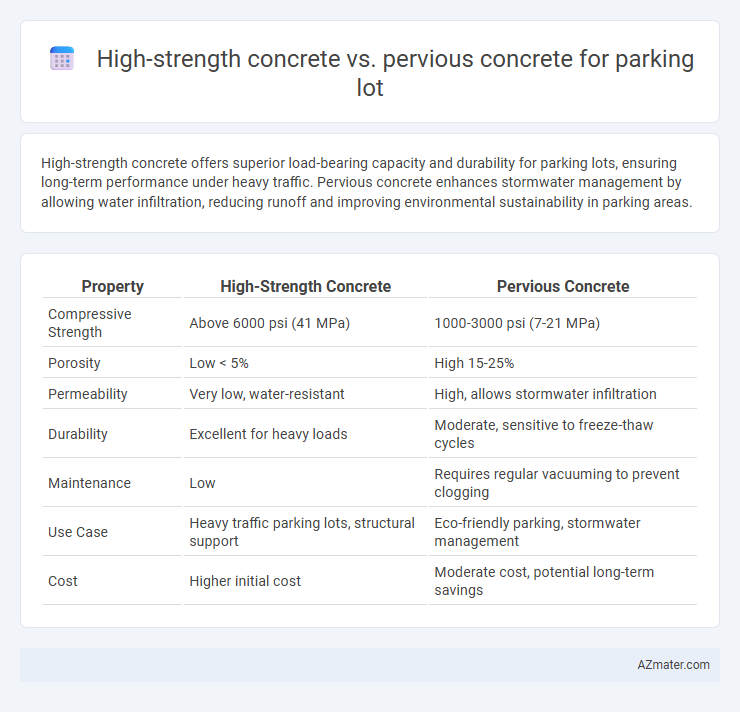High-strength concrete offers superior load-bearing capacity and durability for parking lots, ensuring long-term performance under heavy traffic. Pervious concrete enhances stormwater management by allowing water infiltration, reducing runoff and improving environmental sustainability in parking areas.
Table of Comparison
| Property | High-Strength Concrete | Pervious Concrete |
|---|---|---|
| Compressive Strength | Above 6000 psi (41 MPa) | 1000-3000 psi (7-21 MPa) |
| Porosity | Low < 5% | High 15-25% |
| Permeability | Very low, water-resistant | High, allows stormwater infiltration |
| Durability | Excellent for heavy loads | Moderate, sensitive to freeze-thaw cycles |
| Maintenance | Low | Requires regular vacuuming to prevent clogging |
| Use Case | Heavy traffic parking lots, structural support | Eco-friendly parking, stormwater management |
| Cost | Higher initial cost | Moderate cost, potential long-term savings |
Introduction to Parking Lot Concrete Solutions
High-strength concrete offers enhanced load-bearing capacity and durability, making it ideal for parking lots with heavy vehicle traffic and frequent use. Pervious concrete provides excellent stormwater management by allowing water to infiltrate through the pavement, reducing runoff and improving environmental sustainability. Selecting the appropriate concrete type depends on balancing structural performance with drainage requirements for efficient parking lot design.
Defining High-Strength Concrete
High-strength concrete is characterized by its high compressive strength, typically exceeding 6,000 psi, making it ideal for heavy-load applications like parking lots where durability and resistance to wear are critical. Unlike pervious concrete, which prioritizes permeability and water drainage, high-strength concrete provides a dense, solid surface capable of supporting heavy vehicles without cracking or deterioration. This robust performance ensures long-term structural integrity and reduced maintenance costs in demanding parking lot environments.
Understanding Pervious Concrete
Pervious concrete, designed with high porosity, allows water to infiltrate through its surface, reducing runoff and improving stormwater management in parking lots. Unlike high-strength concrete, which prioritizes compressive strength above 6000 psi for heavy-duty use, pervious concrete typically has lower strength but excels in permeability and environmental benefits. Its unique open-graded mix structure enhances groundwater recharge, making it an ideal sustainable choice for parking lot applications focused on reducing urban heat island effects and managing water sustainably.
Durability Comparison in Parking Lot Use
High-strength concrete offers superior durability in parking lot applications due to its increased compressive strength and resistance to heavy loads and abrasion, ensuring long-lasting performance under constant vehicular traffic. Pervious concrete, while beneficial for stormwater management and reducing runoff, typically has lower compressive strength and higher susceptibility to freeze-thaw damage, which can reduce its durability in harsh parking lot environments. Selecting high-strength concrete enhances structural longevity and minimizes maintenance costs, whereas pervious concrete requires more frequent inspections and repairs to maintain its functional integrity.
Load-Bearing Capacity and Structural Performance
High-strength concrete offers superior load-bearing capacity, making it ideal for parking lots expected to support heavy vehicles and endure high traffic volumes without significant deformation. Pervious concrete, while beneficial for stormwater management and reducing runoff, generally exhibits lower compressive strength and may require thicker slabs or reinforcement to match the structural performance of high-strength concrete. Selecting between these materials depends on balancing structural demands with environmental benefits, where high-strength concrete excels in durability and load resistance.
Drainage and Water Management Capabilities
High-strength concrete offers superior load-bearing capacity for parking lots but has low permeability, leading to potential water runoff and drainage challenges. Pervious concrete enhances water management by allowing rainwater to infiltrate through its porous structure, reducing surface runoff and promoting groundwater recharge. Effective drainage in parking lots depends on the balance between structural strength and permeability, with pervious concrete providing significant advantages for sustainable water management.
Sustainability and Environmental Impact
High-strength concrete offers enhanced durability and load-bearing capacity, reducing maintenance frequency and extending the lifespan of parking lots, which contributes to resource efficiency. Pervious concrete improves stormwater management by allowing water infiltration, thus minimizing runoff and reducing urban heat island effects, promoting groundwater recharge and lowering environmental impact. Combining these materials strategically can optimize sustainability by balancing structural performance with ecological benefits in parking lot construction.
Maintenance and Longevity Considerations
High-strength concrete offers superior durability and requires less frequent maintenance due to its dense composition, making it ideal for heavy traffic in parking lots with long-term structural performance. Pervious concrete enhances stormwater management by allowing water infiltration, reducing surface runoff, but may necessitate regular cleaning to prevent clogging and maintain permeability. Choosing between the two depends on the balance between durability demands and environmental water management needs in parking lot design.
Cost Analysis: Initial and Lifecycle
High-strength concrete demands higher initial costs due to superior materials and mixing techniques but offers extended durability and reduced maintenance expenses over its lifecycle, resulting in cost savings for long-term parking lot applications. Pervious concrete features lower upfront costs and promotes stormwater management, yet its increased maintenance and potential for clogging may elevate lifecycle expenses. Evaluating total cost of ownership, including installation, maintenance, and environmental impact, reveals that high-strength concrete is more cost-effective for high-traffic parking lots, while pervious concrete suits areas prioritizing sustainable drainage.
Choosing the Right Concrete for Your Parking Lot
High-strength concrete offers superior durability and load-bearing capacity, making it ideal for parking lots with heavy traffic and frequent vehicle weight, while pervious concrete enhances stormwater management by allowing water to infiltrate the surface, reducing runoff and promoting groundwater recharge. Selecting the right concrete depends on balancing structural demands with environmental benefits, considering factors like soil permeability, local climate, and maintenance needs. High-strength concrete is preferred for long-term resilience and minimal maintenance, whereas pervious concrete suits sustainable design goals and regulatory compliance in areas with strict water management requirements.

Infographic: High-strength concrete vs Pervious concrete for Parking lot
 azmater.com
azmater.com